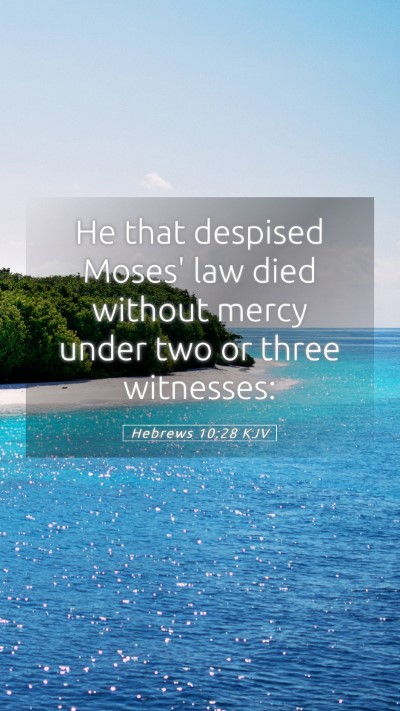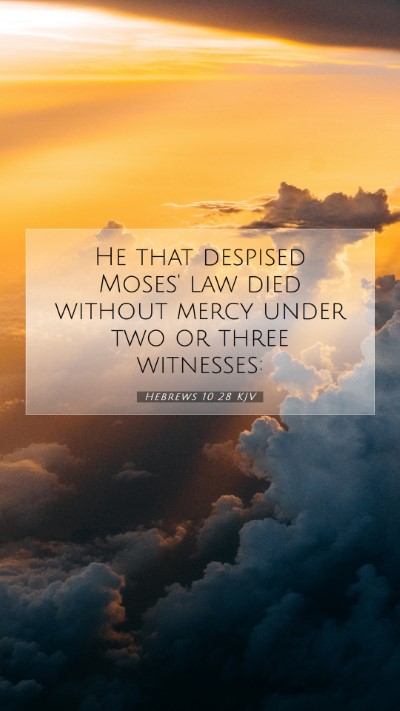Understanding Hebrews 10:28
Bible Verse: Hebrews 10:28 - "Anyone who has rejected Moses' law dies without mercy on the testimony of two or three witnesses."
This verse presents a significant warning to believers, drawing a stark comparison between the consequences of rejecting the law given to Moses and the grave implications of rejecting Christ's sacrifice.
Verse Meaning and Commentary
The author of Hebrews emphasizes the seriousness of neglecting or outright rejecting the foundational teachings of Moses. Let's delve into the understanding and interpretations derived from various public domain commentaries.
Insights from Matthew Henry
Matthew Henry notes that the "law given by Moses" served as a crucial covenant that the Israelites were bound to follow. It provided a framework for holiness and obedience to God. Those who rejected it were subject to severe consequences, as the law stipulated capital punishment for certain offenses. Henry indicates that just as the Israelites faced dire repercussions for disregarding Moses' law, a similar or greater judgment awaits those who reject the grace offered through Christ. His interpretation stresses the gravity of turning away from Christ, suggesting that the punishment for such rejection is far worse than that for neglecting the old covenant.
Insights from Albert Barnes
Albert Barnes elaborates on the comparison between the old law and the new covenant of grace. He emphasizes that under the Mosaic law, the evidence required for condemnation could be established through multiple witnesses, underscoring a divine justice system. Barnes argues that the author of Hebrews aims to make it clear that while the law provided means for human judgment, rejection of Christ leads to divine judgment without mercy. This reinforces the urgency in understanding the severity of rejecting Christ, who fulfilled the law and provided a new way to God.
Insights from Adam Clarke
Adam Clarke provides a contextual analysis, stressing that the verse not only points to the immediate consequences of disobedience under the law but also serves as a prophetic warning about the repercussions of failing to appreciate the sacrifice of Jesus. Clarke suggests that this rejection means turning away from the ultimate revelation of God and His mercy, which is found in Christ. The author warns that, unlike the law under Moses, the mercy offered through Jesus may be disregarded by those who remain obstinately in their sins.
Applications and Insights
The implications of Hebrews 10:28 are clear: rejecting Christ carries significant spiritual consequences. Understanding this verse juxtaposes the weight of the Old Testament laws with the grace offered in the New Testament. For believers, it prompts reflection on their faith and the seriousness of how they respect and respond to God's revelation through Christ.
Cross References
- Deuteronomy 17:2-7: Discusses the process of dealing with a person found guilty of idolatry, showcasing the severity of rejecting God's commands.
- Galatians 3:10-11: Speaks about the curse of the law and the just shall live by faith, reinforcing the transition from law to grace.
- Matthew 12:31-32: Illustrates the severe consequences of blaspheming against the Holy Spirit, akin to rejection of Christ.
- Hebrews 6:4-6: Discusses falling away after receiving the knowledge of the truth and the impossibility of renewal to repentance.
- 1 Thessalonians 5:19: Advises not to quench the Spirit, similar to not dismissing the message of salvation.
Conclusion
In conclusion, Hebrews 10:28 is a powerful reminder of the seriousness of our response to God's grace and revelation through Jesus. The exposition of this verse provides essential Bible study insights, particularly for those examining their understanding of Scripture and exploring the implications of their faith. It serves as a crucial topic for any Bible study group aiming to deepen their grasp of Scripture interpretations and biblical exegesis.


